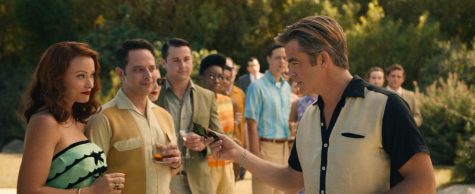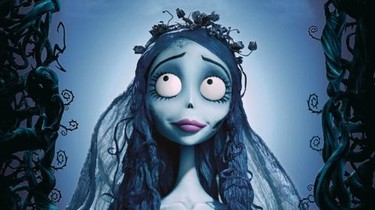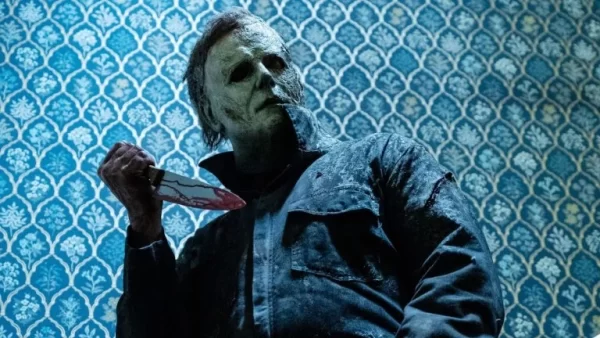Don’t worry about skipping ‘Don’t Worry Darling’
From flakey acting to set gossip, “Don’t Worry Darling” establishes itself as a must see movie for the wrong reasons. With its only saving grace being Florence Pugh.
Like many people, I had been eagerly awaiting the release of Olivia Wilde’s Don’t Worry Darling since the day it was announced. A film starring Florence Pugh—my favorite actress, directed by Olivia Wilde—who wrote and directed my favorite film of 2019, Booksmart? I’m sold. It even has Harry Styles; what more could you possibly want in a film? After the drama surrounding the film’s release and promotion, I was even more excited to see it. Bad or good, it was definitely going to be interesting. Unfortunately, I was mistaken. While Don’t Worry Darling is a well-shot and decently acted film, it is entirely mediocre.
As Harry Styles puts it, this movie certainly felt like a movie vulture. There’s action, there’s intrigue, there’s even a dance number. Visually, the film is stunning. The cinematography is beautifully done, showing off sun-drenched desert landscapes, glamorous black-tie events, and hauntingly surreal dream sequences. The set and costume design are impeccable; everything looks perfect to the point of artificiality. But the movie suffers from a classic case of style over substance. No amount of exquisitely done eyeliner or perfectly composed shots can make up for the disjointed writing and mixed messaging.
Don’t Worry Darling follows a woman named Alice Chambers (Pugh) who lives with her husband Jack (Styles) in a desert town called Victory. All the men who live in the town work for the Victory Project, a company run by the enigmatic, charismatic Frank (Chris Pine). Pugh leads a typical 1950s housewife life, which includes cooking, cleaning, shopping, drinking constantly, and having sex with her husband. As strange events begin to occur around her, Alice grows paranoid that things in Victory are not what they seem. The huge twist of the movie is that Alice Chambers is actually a woman named Alice Warren, a surgeon who lives with her unemployed boyfriend, Jack. Alice has been kidnapped and forced into a Matrix-like simulation by Jack to supposedly give them a perfect life. Frank is revealed to be the leader of a misogynistic cult who started the Victory Project so that men can live in their ideal society with their chosen wives. This requires the men to keep their wives sedated and strapped to a device that places their consciousness in the simulation without their knowledge or consent.
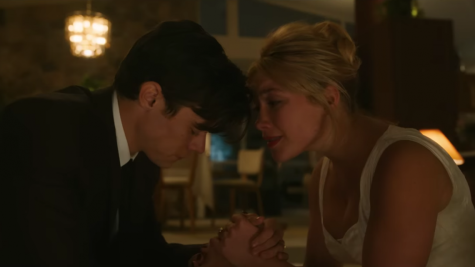
Florence Pugh stands out as the star in this film. Each member of the cast has a moment to shine, but Pugh is in nearly every single scene; you can’t take your eyes off her. She portrays her character with such depth of emotion that one might forget that she isn’t actually stuck in a simulation that’s causing an existential breakdown. That’s why it’s almost comical when she’s acting off of Styles, who seems to be able to express two emotions: happy and mad. Styles might not be a bad actor in any other film, but next to Pugh he’s flat and wooden. Their argument scenes showcase the disparity in their acting abilities. Styles just raises his voice like he’s in a middle school play trying to project to the back of the room, but Pugh’s voice trembles with fear, guilt, and betrayal all at once. There were moments where I didn’t realize Styles was in the frame because I was so enthralled by Pugh’s performance.
The other actors all make a valiant effort of bringing their characters to life; Chris Pine as Frank is sinister yet effortlessly charismatic. Gemma Chan plays Frank’s wife, Shelley, who is elegant, cold, and seems to know something we don’t. Olivia Wilde’s role as Alice’s closest friend, Bunny, is also quite compelling. She’s mature, intelligent, and has presumably been in Victory for quite some time. The other wives and husbands all play their roles with the requisite amount of culty loyalty and enthusiasm.
Unfortunately, none of the other characters get nearly the development that Alice does. Frank is the mastermind behind the entire Victory project, yet his motivations are never explained, making him cartoonishly narcissistic and evil.
He tells Alice that he appreciates her for “challenging” him and pushing him to new heights, but it is unclear what his ultimate goal is. Bunny is another woefully underdeveloped character; they reveal in the last ten minutes that she’s been aware that Victory is a simulation all along, but she chose to stay in order to live in a world in which her kids are alive. With better writing, that would have been a clever character choice, but it was shoehorned in at the last moment to make Bunny’s calculating character more sympathetic.
However, the most criminally neglected character is Margaret (KiKi Layne), a wife we are told used to be friends with Alice; who lost her son mysteriously and suffered a mental breakdown. The audience only sees Margaret post-breakdown, when she interrupts Frank’s house party with ominous ramblings, and the rest of the town shuts her down. She goes to Alice for help, only to be ignored and ultimately slitting her throat on the roof of her house. Margaret is the canary in the Victory coal mine, but she is treated like an expendable plot device. As a character, she is given no backstory and no discernable personality. All of this makes sense when you learn that most of KiKi Layne’s scenes were cut from the final film, presumably to make more room for the minute-long Harry Styles tap dance number.
Jack should also be a much more complex character, but thanks to Styles’ amatuer portrayal and bland dialogue, his character is messy and perplexing. Styles’ performance lacks all of the nuance that a character such as Jack requires. He is convincing as a loving husband, but he shouldn’t be. He’s a man who drugged and kidnapped his girlfriend, holding her hostage in an alternate reality run by a misogynistic podcaster. When he’s shown in the real world, Styles acts as if he’s playing a completely different character; there’s no connection between simulation Jack and real life Jack. The result is confusing and clouds the message that Wilde is trying to send with her film.
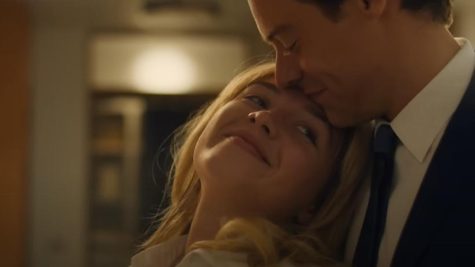
Which brings us to the biggest upset regarding the film; it knows what it wants to say but it fails to say it. The film has some impressively creative scenes, but they did nothing to articulate the broader story. In one scene, Alice wraps cling film around her head to suffocate herself and has to claw her way out. It’s a stomach-churning moment, and that’s the only purpose it serves. Her suicidal urge is not brought up again and has no bearing on the plot. In another scene, Alice cracks an egg into a bowl only to discover there is nothing inside the shell—which feels like a perfect metaphor for this film. Wilde advertised her film as feminits, psychological thriller, but what we got was an empty, plot-holed story with no mass or depth. Its political messages are simultaneously heavy-handed and half-baked. One of the main selling points of the film is its focus on female pleasure. Olivia Wilde proudly declared in an interview with Variety, “men don’t come in this film […] Only women here!” variety Sure, that might be a feminist message on the surface, but how does that make any sense in a film about women who have been kidnapped, gaslit, and tortured? Is female orgasm more feminist than female autonomy? Neither the movie or Wilde seem to be able to make up their minds. DWD has some stunning visuals and cleverly directed scenes, but it adds up to be less than the sum of its parts.
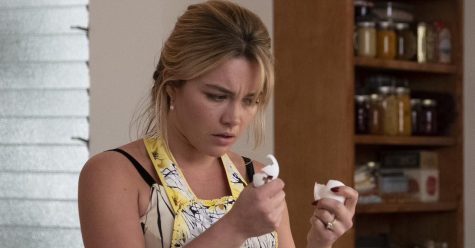
What’s a movie without the behind the scenes drama? The film attracted plenty of buzz for the wrong reasons dealing with layers of drama. It all started when news broke that Olivia Wilde and Jason Sudeikis ended their seven year engagement. to begin a relationship with Styles on the set of DWD. Styles had taken over the role of Jack from Shia LaBeouf, who Wilde claimed she fired because “he comes at his work with an intensity that can be combative.” vanity fair LaBeouf denied these claims and leaked a video showing that Wilde tried to keep him on the film, sarcastically saying “You know I think this might be a wake up call for Miss Flo […]” variety
According to rumors, Pugh and Wilde did not get along on set, supposedly because of the intimate relationship between Wilde and Styles. Pugh did not promote the film on social media, and she just barely made an appearance for the international premiere at the Venice Film Festival. And, of course, there’s the rumors of Harry Styles spitting on Chris Pine’s lap. It’s all very entertaining.
The cast and crew deny any allegations of unprofessional conduct, Wilde does nothing but sing the praises of Pugh as an actress, and Harry Styles did not spit on Chris Pine. But when you think of DWD, that’s what you think about. The film is overshadowed by the media circus surrounding it, and it isn’t a good enough film to be talked about in its own right. Perhaps that’s for the best, for the sake of the film. Once you start to analyze it, you realize that it crumbles under any scrutiny like an empty eggshell.
